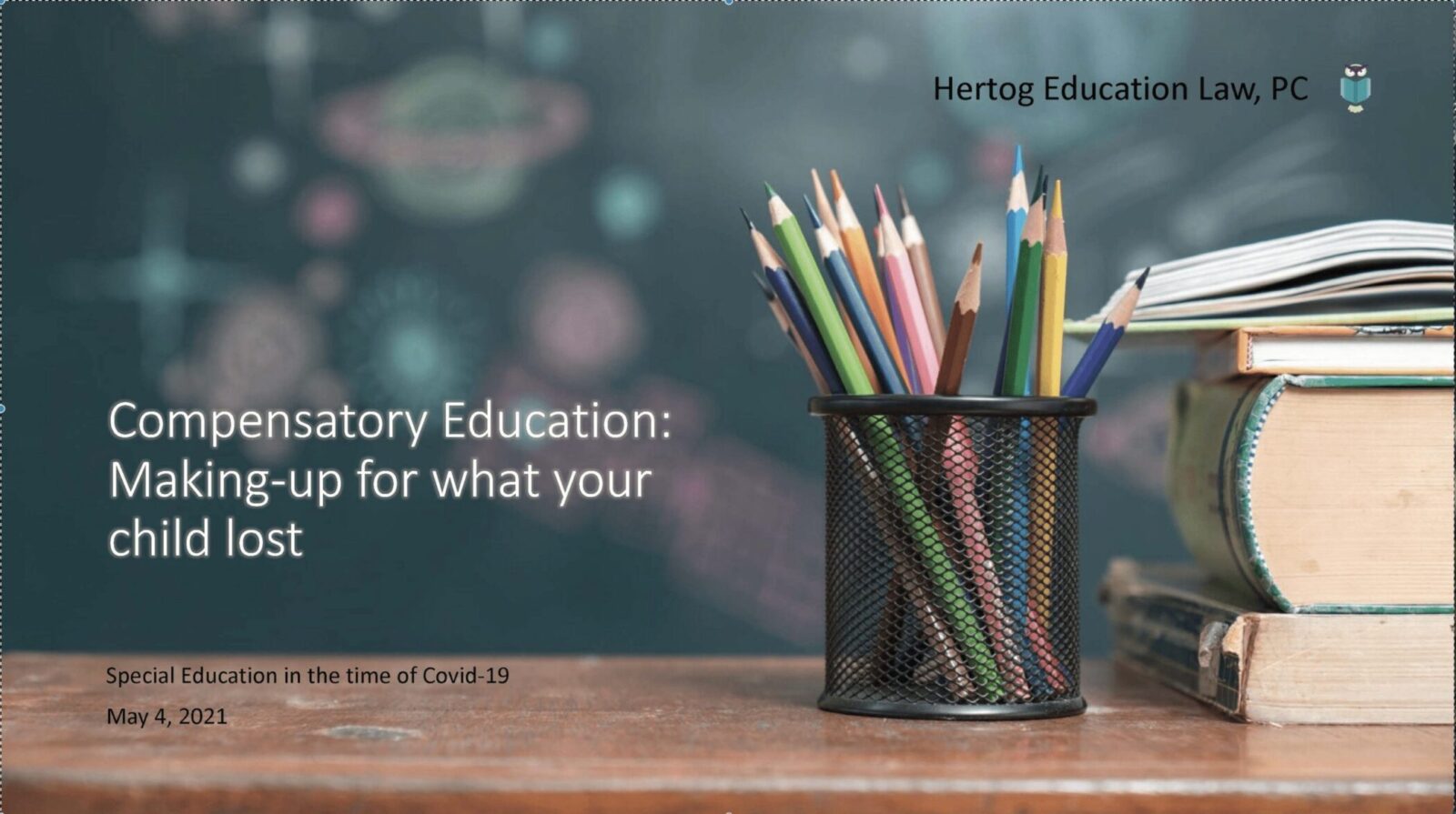Get Comp Ed for COVID Learning Loss
What Is “Comp Ed”?
Compensatory education is a legal concept that has been around for decades but has had renewed interest during COVID-19. Technically it’s been a legal remedy that may be granted by a judge. Practically, compensatory education is a tool parents should leverage. It can make-up for what your child lost during the pandemic. Under the Individuals with Disabilities Education Act (“IDEA”) parents may be entitled to comp ed if their child has been deprived of a Free Appropriate Public Education (“FAPE”). As a result of distance learning during COVID, your child with an IEP may be entitled to compensatory education based on an individualized determination of what they lost during the pandemic.
What Comp Ed is NOT.
Comp ed is NOT something schools give to all children. For example, some school districts are giving all children, regardless of whether or not they have an IEP, an extra two weeks of intensive instruction. That’s not an individualized determination of what your child lost. That’s something applied to all students across the board.
Comp ed is NOT something only based on your child’s IEP goals. Some schools may offer you extra tutoring if your child didn’t meet his IEP goals during distance learning. That’s ok, but that may not be enough to compensate for everything your child lost during the 2020-2021 school year. Remember, IEP instruction is only a fraction of what children get during a typical school year. Schools are required to provide an entire standardized curriculum at each grade level. As a child with an IEP your child is entitled to that.
Comp ed is NOT “recoupment” or “recovery” services. Some schools will offer you in an IEP meeting what they call “recoupment” or “recovery” services. Those terms mean nothing in the law. Your child has no right to those services. So if you agree to those services, you could be settling for much less than comp ed. The concept of compensatory education has been around for decades and is well-defined in the case law. So if you request comp ed, you can get something well-defined.
Comp ed is NOT more distance learning. If distance learning didn’t work for your child, why would you get more distance learning as a remedy? Some schools will say that your child can get virtual instruction to “make-up” for what they lost during the pandemic. That’s not an individualized determination of what your child lost. That’s not comp ed. Making the case for Comp Ed in an IEP meeting.
Parents should request comp ed during their IEP meetings. You can request an IEP meeting at any time and I recommend that you call one ASAP. In March 2020 at the very beginning of the pandemic U.S. Secretary of Education Betsy Devos said:
“If a child does not receive services after an extended period of time, a school must make an individualized determination whether and to what extent compensatory services may be needed, consistent with applicable requirements, including to make up for any skills that may have been lost.”
That means that you shouldn’t have to file due process to get comp ed. The truth is that eventually you might have to file due process because schools will be reluctant to provide IEP students with what they’re entitled to under the IDEA. They just rather not comply with the law, if they’re not put to the test. Most of those due process cases will settle.
In any case, I recommend that parents try to get comp ed in IEP meetings before filing due process. Here’s some information parents can use to show what your child lost.
Show What Your Child Received During Distance Learning:
- Daily District Records re Child’s Participation in Distance Learning*
- Child’s Level of Engagement in Instruction and Therapies*
- Any Videos or notes of your Child’s Frustration.
- Info on Whether Instruction and Therapies Were Effective
- Info on Whether Child Met IEP Goals
- Info on Whether Child Regressed
- Ask for Assessments
- Ask to Draft New Present Levels of Performance and Goals Based on Those Assessments
- Find Out What Curriculum Students Should Have Learned During the 2020-2021 Year
- Compare Where They Are Now to Before Distance Learning
- Compare What They Know Now to What They Should Know
Final Thoughts
Comp ed is a complicated issue, but that shouldn’t stop you from pursuing it. California parents, please contact me for a free consultation. I also provide free and low cost due process representation for California parents. For more information on, please see my May, 2021 presentation here.

